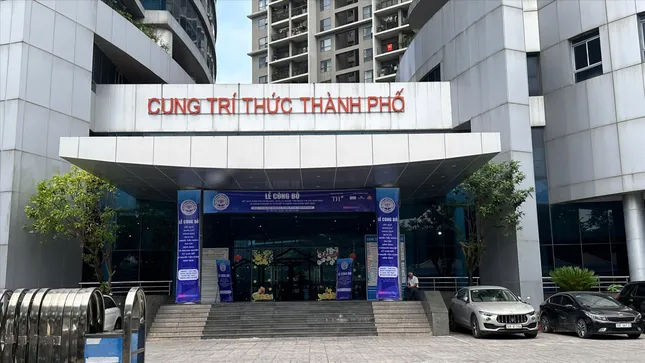Hanoi is one of the localities with the largest number of public assets in the country, with over 5,200 offices and operational bases, approximately 27 million square meters of land, and 17 million square meters of buildings. Hanoi has identified 291 redundant bases that need to be addressed through rearrangement.
According to the Hanoi Department of Finance, the rearrangement and disposal of offices and government buildings face challenges due to the lack of standards and norms for the utilization of public assets. It is difficult to repurpose unused school buildings and remote health stations as cultural, medical, or educational facilities. Transferring their management to real estate businesses or the Hanoi Land Development Center is also problematic in terms of supervision and maintenance.

Caption: Hanoi Intellectual House – one of Hanoi’s public buildings awaiting rearrangement. Photo by NHƯ Ý
Hanoi has a backlog of specialized land and building rearrangement projects. There is a lack of uniformity in the management and utilization of the first floors of resettlement apartments, worker housing, and commercial apartments, including nearly 800 houses and land plots and three housing funds (resettlement apartments, social housing, and the Hanoi Intellectual House) that require scrutiny. Many properties lack information on their construction year, year of commissioning, original value, and residual value.
During a working session with the Hanoi People’s Committee on June 6th, Vice Minister of Finance Bui Van Khanh emphasized that redundant offices must not be sold and that alternative utilization plans are necessary.
Vice Minister Khanh suggested repurposing redundant assets into schools, medical facilities, parks, or senior citizen recreation areas. He urged Hanoi’s departments to provide recommendations to the People’s Committee, emphasizing that the responsibility for this task should not be solely shouldered by the finance department. He cautioned against merely transferring redundant assets to the Land Development Center without a clear plan, as this could lead to potential waste. Instead, departments should actively collaborate to find suitable solutions.
Request to convert redundant offices into hospitals and health stations
Given the shortage of medical facilities serving the people of Hanoi, Mr. Nguyen Dinh Hung, Deputy Director of the Hanoi Department of Health, requested to convert redundant offices into hospitals and health stations. Mr. Hung noted that in addition to the existing hospitals and health stations, Hanoi has 32 ongoing healthcare construction projects, but they are still insufficient to meet the demand.
“We propose to coordinate with the Department of Finance to suggest the transfer of redundant properties for use in the healthcare sector and adjust the planning accordingly,” said Mr. Hung. “Large structures can be allocated as hospitals, while smaller ones can be utilized as health clinics, with the principle of being as close to the people as possible.”
A representative from the Ministry of Health shared that the ministry is currently drafting a circular on the functions and tasks of commune and ward health stations. They recommended that the Hanoi People’s Committee and the Department of Health establish new health stations in convenient locations with larger scales. These new health stations will be equipped with additional functions, expanded capabilities, and even ambulances.
Leaders from various ministries and sectors expressed support for the initiative to transform redundant offices into medical, educational, and cultural facilities. A representative from the Central Inspection Committee affirmed that many public hospitals in Hanoi are overloaded, and the process of rearranging offices presents an opportunity to expand their infrastructure.
A representative from the Ministry of Natural Resources and Environment advised that when transferring offices from old to new locations, departments only need to hand over the premises without changing the land use purpose. Departments that convert offices into hospitals or schools can proactively coordinate with the construction sector to adjust the functions accordingly.
Mr. Nguyen Manh Quyen, Vice Chairman of the Hanoi People’s Committee, proposed that ministries and sectors promptly issue standards, unit prices, and norms for office areas and vehicles to provide a basis for local implementation.
“This is an excellent opportunity to review and rearrange public assets,” said Mr. Quyen. “I suggest that the competent authorities implement a reverse mechanism, whereby public assets are first transferred to the healthcare, education, and cultural sectors, and the planning is adjusted afterward. Waiting for the standard planning process will cause delays and miss this opportunity. Ministries and sectors should introduce special mechanisms to handle the rearrangement of land and buildings.”
In response to the proposal from the Vice Chairman of the Hanoi People’s Committee, Vice Minister Bui Van Khanh instructed the Department of Public Property Management to develop a document on norms and standards for public assets that align with the new situation. The Ministry of Finance will report to the Government and issue regulations as requested by the Hanoi People’s Committee.
Addressing public asset issues raised by Tien Phong Newspaper
On June 6th, Vice Minister of Finance Bui Van Khanh shared with Tien Phong Newspaper that the Ministry has addressed the public asset issues highlighted in their reporting. The Ministry organized a working session with local finance departments facing challenges in handling redundant offices.
“The difficulties in handling redundant offices, as mentioned in Tien Phong Newspaper, mainly arose during the previous merger phase, and the Ministry of Finance has essentially resolved them,” said Vice Minister Khanh. “We are preparing a report to be submitted to the National Assembly Chair, and we will inform Tien Phong Newspaper of the results.”
Previously, on May 6th, Tien Phong Newspaper published articles titled “Redundant Offices After Mergers: How to Manage?” and “Unused Commune and District Headquarters: No Buyers.” National Assembly Chair Tran Thanh Man instructed his secretary to take photos of the articles and send them to the Minister of Finance, emphasizing the need for guidance in this matter.
















